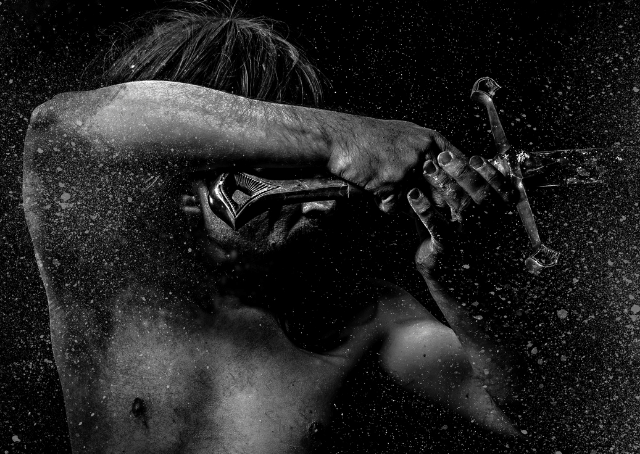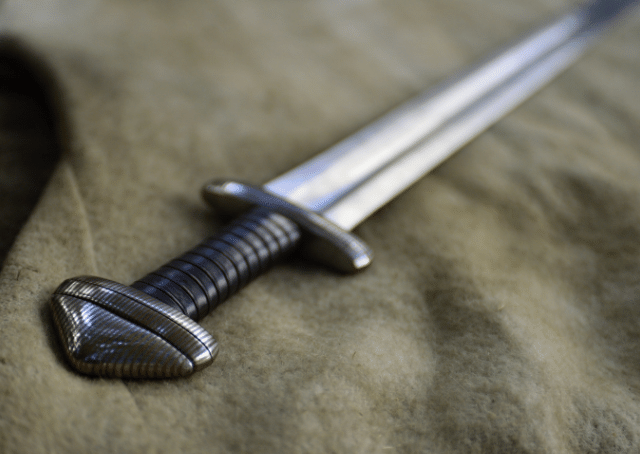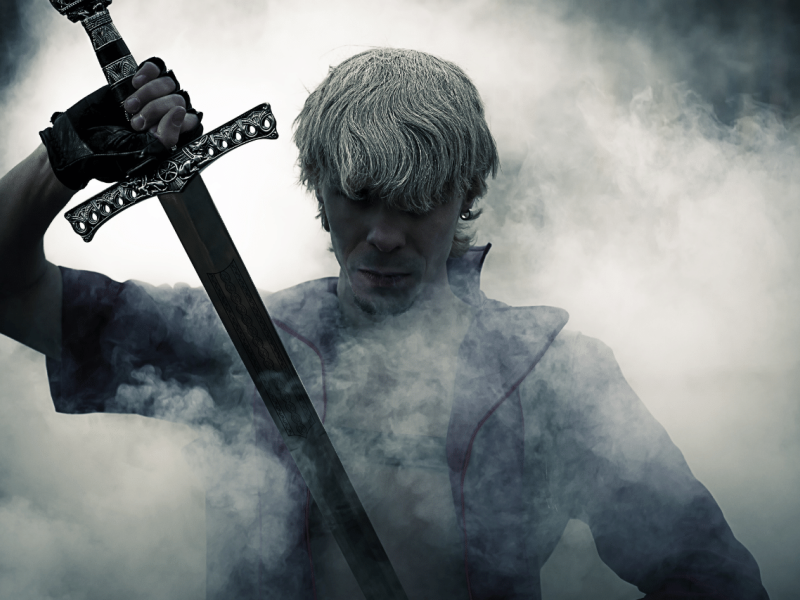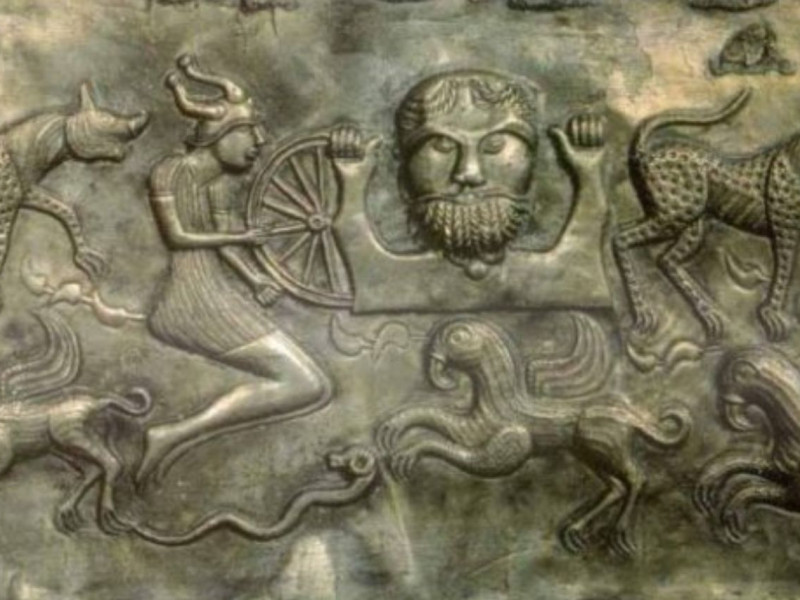Nuada
Nuada: The Silver Hand
Nuada was the first king of the Tuatha dé Danann, the pantheon of the Celtic gods.
He reigned for seven years before the Tuatha dé Danann decided to move to Ireland and leave their mystical lands. Nuada was a just and powerful god, and he had a powerful sword that could defeat any enemy once drawn.
This article will describe how this powerful god-king lost his hand in battle, making him unfit for the throne.
Who Is Nuada in Celtic Mythology?
Nuada was one of the gods of the powerful Tuatha dé Danann, and he was their king for a time. His name may stem from the Proto-Celtic word “noudent” which means “to capture or acquire through the skill of hunting.”
He was a very good hunter and fisher, and his skills surpassed any others in his kingdom. His full title is Nuada Airgetlám, which means “Nuada of the Silver Hand.”
This title relates to the sad loss of his hand in one of the battles for the conquering of Ireland. Nuada was a good and just ruler, and he also followed the rules that he set for his people. Part of his power came from the fact that he had one of the four treasures of the Tuatha dé Danann: a sword, the sword of Nuada. Nuada’s sword, when unsheathed, could defeat any enemy.
He lived on Brú na Bóinne, but he later lost this to the Dagda, who became chief of the Tuatha dé Danann. Nuada was married to Boann, a river goddess, but it was an unhappy union, and it produced no children. They decided to divorce, and later, Nuada passed his kingdom to a man named Bres on the Emerald Isle. But this would prove to be a very bad idea.
Myths of Nuada Silverhand, King of the Gods
Nuada was the king that led his people from their other isles to that of Ireland to search for a new home. But it was already inhabited, and so when they first arrived, they were not in control of it. He made his home at Brú na Bóinne for a time, and he held his court at the Hill of Tara.
Soon enough, Nuada began to plan how he could take over the island. He wanted to take it back from the Firbolg and the dangerous Fomorians who occupied it.
The First Battle of Moytura
The fight for control of Ireland took place in two battles. The first one took place at Cong against the Firbolg. The Tuatha dé Danann fought bravely, and they won against this first group of people, but it came at a price. Even though they were victorious, King Nuada lost his hand.
It was taken by one of the Firbolg warriors named Sreng. While that was a tragedy, it normally would mean nothing for the status of a king, but not in this case. Nuada was a rule-follower. He had written the rule of kings that a king of his people must be physically and wholly intact.
So after he lost his hand, he could no longer legally be king, and he would have to abdicate. He even rewarded the Firbolg warrior who had taken his hand and gave him back a piece of land on which to rule. After he knew he could no longer be king, he gave his throne to a man named Bres.
The Second Battle of Moytura
However, this choice made a second battle occur. Because while Bres was connected with the Tuatha dé Danann and married to the goddess Brigid, he was half-Fomorian. So once the battle between the Tuatha dé Danann and the Fomorians began, Bres joined the Fomorian side. When the Tuatha dé Danann were defeated, he enslaved them for many years.
During this time, Nuada was enraged about the choice he had made for his successor. So he made plans to reclaim his throne. With the help of his two brothers, Dian Cécht (healer) and Goibniu (god of smiths), he was able to get a new hand. But this time, it was made of silver.
Because he now had a silver hand, he was able to get back his throne as king. Even later, he used magic to produce himself another flesh hand. So Nuada reclaimed his title as king after they were able to overthrow Bres. They celebrated their victory, but they had not yet fought the Fomorians to take claim of Ireland.
Nuada and Lugh
During the celebration, a young man named Lugh came to Nuada to present himself. He offered his services. Nuada agreed and asked Lugh to create a battle plan to help defeat the Fomorians. But Nuada secretly knew that Lugh was half-Fomorian.
He was also the grandson of the infamous Balor of the Evil-Eye. Lugh was prophesied to kill his grandfather, and so Nuada needed him as part of their force. In battle, it worked. Lugh killed his grandfather, but not before Balor of the Evil-Eye cut off Nuada’s head. Despite that, the Fomorians were defeated.
The Tuatha dé Danann gained the Emerald Isle, and Lugh became the next king. He was just the kind of ruler that Nuada had been.
Nuada and Other Gods
Nuada was a very popular figure in Celtic mythology. His stories were often mixed and matched with other characters.
There are many other comparable gods in the same region:
Nodens: British god of the sea and healing
Nudd: Welsh god
Llud Law Eraint (Llud of the Silver Hand): Welsh god
Tyr: Norse god who also lost a hand
Sabazios: An Indo-European god who also had a sacred, special hand
Nuada in Pop Culture
In current media, Nuada has been featured in a few comic books and games:
Nuada plays a prince who tries to use a Golden Army to reclaim earth from the humans in “Hellboy 2”
In Marvel comics, he is a god of the Celtic pantheon who possesses people and fought against another representation of himself
He is represented as a demon named Airgetlám who only comes to earth every so often in the Megami Tensei series.
Conclusion
Nuada was a proud and just ruler and king of the gods.
Take a look at the main points about King Nuada of the Silver Hand that were covered in this article:
Nuada was the first king of the Tuatha dé Danann, the gods of the Celtic pantheon
He ruled for seven years before his people moved from their mystical and magical lands to Ireland
His name probably comes from the Proto-Celtic word “noudent.” This word root means to capture through hunting or fishing
He was a very skilled hunter and fisherman. He was the best of his people, not unlike Lord Arawn of the Welsh Otherworld
His full name was Nuada Airgetlám which means “Nuada of the Silver Hand.” His story with the hand is what Nuada was most famous for in Celtic mythology
Nuada was a powerful ruler. He had one of the four gifts of the Tuatha dé Danann, and it was a very special sword. Once he drew the sword, none of his enemies could escape its power, and they would be defeated
He was also a very just ruler and very focused on rules. He would always follow the rules that he outlined in his kingdom, even if they put him at a disadvantage
Nuada led the Tuatha dé Danann to Ireland where they made their new home. However, the Firbolg and the Fomorians already occupied it. They would later have to battle them for ownership of the land
Once they arrived in Ireland, and with his wife, Boann, a river goddess, he made his home in Brú na Bóinne. He held a council on the Hill of Tara. However, there were no children that came from the marriage, and they didn’t get along, so they later divorced
Sadly, the king even lost his home to the Dagda, chief of the Tuatha dé Danann, who stole it through a bit of cheeky wordplay
He began to make plans to take over, and so the First Battle of Moytura began against the Firbolg
The Tuatha dé Danann defeated them, but sadly, King Nuada lost his hand to a strong warrior named Sreng
He gave Sreng some land for his efforts, and they took over the Firbolg section of land. It was now time to defeat the Fomorians
But because of one of his own rules where a king can’t rule unless he is physically whole, he had to leave the throne. He made his successor Bres
But Bres was half-Fomorian. He took the Fomorian side when the Tuatha dé Danann battled against them
They lost, and Bres enslaved the Tuatha dé Danann for many years
During that time, Nuada’s brothers helped him fashion a silver hand to make him whole again. and they staged a coup to take the throne back
They were successful, and they were able to battle against the Fomorians again
This time, they included a young man named Lugh, who was prophesied to kill his grandfather. His grandfather was also the leader of the Fomorians: Balor of the Evil-Eye
The Tuatha dé Danann defeated them, and Lugh killed his grandfather. But Balor of the Evil-Eye decapitated Nuada, and so Lugh became king in his stead
Nuada is featured as a character in “Hellboy 2,” Marvel comics, and the Megami Tensei series
King Nuada had a bit of a difficult time in his life, and yet he stuck to the rules and his own conscience. He lost his wife, had no heirs of his own, chose the wrong successor, lost his hand, and then his life, but he was remembered as a good king.
He gave all for his people for them to have a better life on the Emerald Isle, and his story will be remembered. Besides, what other king lost his hand to a warrior and then rewarded that same warrior?






